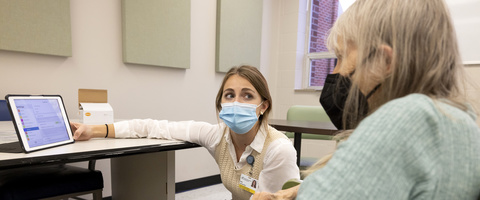By Will Bower
AAC Allies, a virtual support group for people with aphasia who use augmentative and alternative communication (AAC), is a clinical experience in the Department of Communication Sciences and Disorders (CSD) in the College of Liberal Arts and Sciences that attracts participants from around the world. The calls are hosted in conjunction with Join in Aphasia, a free program facilitated by Lingraphica, an AAC technology company.
Aphasia is a communication disorder that affects a person’s ability to use or understand language. It can be caused by stroke, brain injury, or a condition called primary progressive aphasia.

Three CSD graduate students–Haley Copenhaver, Emma Braband, and Dahlia Cukierkorn–facilitate AAC Allies’ weekly calls, leading large group discussions and breakout sessions. Discussions center on a variety of topics with the goal of supporting and empowering participants. The group is supervised by clinical professor Krista Davidson.
Davidson said the group began in January 2024 and has consistently been a student favorite.
“Through my interactions with Lingraphica, I found out that graduate students and I would be welcome to host a weekly session within this program,” Davidson said. “I thought it would be a great opportunity for my team to broaden their experiences with different populations who benefit from AAC.”
AAC Allies provides an opportunity for graduate students to work with adults with a range of AAC needs. Copenhaver said being part of the group has helped her become more independent and patient.
“I have improved my skills in facilitating group discussion by being comfortable with silence and taking a step back to allow members to communicate at their desired pace,” Copenhaver said.
Copenhaver said that she sees herself working with AAC in her future career.
“For clients with limited communication, this would be my go-to in helping them express themselves,” Copenhaver said. “I love seeing my clients interact with AAC because I can see how much it helps them communicate their wants and needs without frustration.”